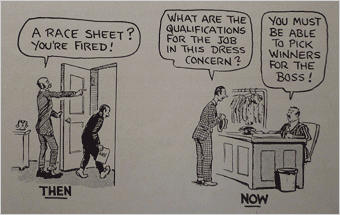Readings: Kling

“In former days, if a business man was known to be a horse player, his credit was immediately cut off. The office boy who was caught reading a racing paper was fired on the spot. Nowadays, however, the business man not only plays the races, but owns horses as well, and the office boy gets a raise if he can pick some good tips for the boss.” — From “Stuff About Steeds,” by Ken Kling (Maywood, 1941)
Goodbye, Tom Ainslie
“Richard Carter, a newspaper journalist and author who wrote on crime, medicine and baseball but was best remembered for his books on racetrack handicapping under the pseudonym Tom Ainslie, died last Saturday in New City, N.Y. He was 89″ (New York Times).
Among the books Carter wrote as Ainslie are “The Compleat Horseplayer” (excerpt), “Ainslie’s Encyclopedia of Thoroughbred Handicapping,” and “Ainslie’s Complete Guide to Thoroughbred Racing,” a now classic handicapping primer. “Before him, there was a widespread assumption that the only thing a horseplayer would want to read was a pamphlet with some quickie system in it,” said Andrew Beyer of the author. “He was the first person to really write literately and intelligently about handicapping” (DRF).
More from Bill Finley: “Anyone who has ever written a handicapping book, enjoyed a handicapping book or profited from reading a handicapping book owes thanks to Dick Carter.”
Pandora’s Box
From one of the new additions to the Railbird library, found at Lyrical Ballad in Saratoga — which, along with Robin Bledsoe’s Cambridge bookshop, keeps me well-stocked in racing books:

“The new horseplayer opening Pandora’s Box: A Box loaded with disappointment and spirited fun, and always chock full of treasure for lucky guys and dolls.” — From “A Primer for Eastern Racing,” by Norman Kisamore (Dodd & Mead, 1963). Note disappointment comes first, ahead of fun and treasure. The game hasn’t changed so much in the last 40 years …
Copyright © 2000-2023 by Jessica Chapel. All rights reserved.